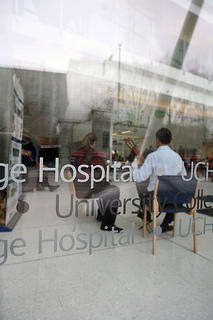According to the Stroke Association every year an estimated 150,000 people in the UK have a stroke of which a third are likely to be left disabled  and need rehabilitation. Recognising that music can only be a part of the rehabilitation process after reading research in this area, we found music was beginning to be recognised as having significant results, for example: “Researchers in Spain and the UK have demonstrated that stroke patients who have lost part of their spatial awareness experience enhanced visual awareness when listening to music that they like. ‘Music appears to improve awareness because of its positive emotional effect on the patient’, Dr David Soto of Imperial College London, 2009. We contacted Dr Soto who encouraged us to run music projects in stroke wards.
and need rehabilitation. Recognising that music can only be a part of the rehabilitation process after reading research in this area, we found music was beginning to be recognised as having significant results, for example: “Researchers in Spain and the UK have demonstrated that stroke patients who have lost part of their spatial awareness experience enhanced visual awareness when listening to music that they like. ‘Music appears to improve awareness because of its positive emotional effect on the patient’, Dr David Soto of Imperial College London, 2009. We contacted Dr Soto who encouraged us to run music projects in stroke wards.
During 2011 we ran projects in the stroke ward at Charing Cross Hospital and two stroke wards at St George’s Hospital, Tooting. The aim of each of these projects was to contribute to, and measure the impact on rehabilitation from stroke and/or neurological illness through six interactive live music performances.
We aimed to provide music from different genres, on a range of instruments, played by musicians who could respond to requests and communicate with patients of different ages and cultural backgrounds. We hoped that the music would include the following outcomes;
- Released emotions
- Stimulated memory
- Engagement in shared activity
- Stimulated interactions between patients
- Distraction from illness
- Shared activity between patients & staff
- Improved relaxation
- Improved feeling of wellbeing
- Improved optimism about future
The patient and staff response was unanimously positive.
“The music was so powerful it made me feel hopeful for the future.” Patient
At the close of the project, Dr Paul Bentley, Consultant for Neurology and Stroke Medicine who had worked closely with LMN in facilitating these sessions said:
“I and other staff members have truly appreciated your contribution to the spiritual wellbeing of our patients. I would be happy to support your application for further funding in future, and believe it could be used as an adjunctive therapy in neuro-rehabilitation centres more generally.”
